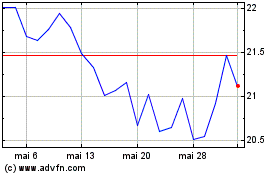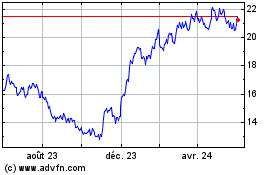Latest Research Report From Sallie Mae and Ipsos Identifies Barriers to College Completion
03 Avril 2024 - 4:04PM
Business Wire
'How America Completes College 2024' Breaks
Down Differences Between Those On Track Toward Graduation and Those
At Risk Of Non-Completion
First-Generation Students Are Twice As
Likely To Seriously Consider Leaving College Before Completion
Compared To Students From College-Educated Families
One in four current undergraduate students have seriously
considered leaving college or have been at risk of dismissal,
according to “How America Completes College 2024,” a national study
from Sallie Mae and Ipsos. Sixty-four percent of students report
being on a successful path to graduation, never having considered
leaving school, and another 12% have considered leaving, but not
seriously.
This press release features multimedia. View
the full release here:
https://www.businesswire.com/news/home/20240403615183/en/
At-risk students cite financial challenges (30%), changes in
motivation (24%), and mental health issues (18%) as primary
barriers to college completion. In fact, mental health challenges
are a concern for half of all current students. Only half (50%) of
current students rated their mental health as good or
excellent.
Sallie Mae’s “How America Completes College 2024” compares the
perceptions of higher education among young adults, ages 18-30,
currently enrolled in a 2- or 4-year program, and young adults of
the same age range, who began their degree but withdrew before
completing.
Nearly nine in 10 (88%) first-generation students believe
college is an investment in their future, yet 41% of those who are
first in their family to attend college have seriously considered
leaving college compared to 18% of students from college-educated
families. First-generation students are also more likely to work
longer hours while in school and found it difficult to prioritize
mental health, compared to other students (58% and 44%,
respectively).
“The research highlights that college can be a challenging
experience for all students as they are learning to balance school,
social, and all their other responsibilities,” said Jennifer Berg,
vice president, Ipsos. “While facing these challenges,
unfortunately, mental health is taking a back seat for many
students, particularly those who may not have the same support
systems to help guide them through this new phase in their academic
careers.”
Approximately six in 10 (57%) students at risk of not completing
come from low–income households. Additionally, more than half (53%)
of at-risk students who have a job report working more than 20
hours a week, compared to just one quarter (25%) of on-track
students who are working while in school. At-risk students are
nearly three times more likely to have transferred schools compared
to on-track students and are also more likely to come from diverse
backgrounds, including being Hispanic, Black, or part of LGBTQIAA+
communities.
Having a plan to pay for college before enrolling is linked to
students being on track to graduate; almost half of on-track
students (46%) had a plan to pay for all four years of college
compared to a quarter of at-risk students (25%).
“We need to support early college planning, especially for
first-generation students and those from underserved communities,”
said Nic Jafarieh, executive vice president, Sallie Mae.
“Developing programs and resources to keep students on track while
they are in school, simplifying the college transfer process, and
meaningfully expanding Pell Grants and connecting more students to
scholarships can also help boost college completion.”
Nearly half (48%) of those who did not complete their program of
study indicated financial challenges played a role in their
decision to leave school. However, almost half of non-completers
(45%) have plans to return to college in the next five years and a
third (31%) plan to definitely return to college in the next
year.
For more information or to access the complete “How America
Completes College 2024” report, visit www.salliemae.com.
Sallie Mae (Nasdaq: SLM) believes education and life-long
learning, in all forms, help people achieve great things. As the
leader in private student lending, we provide financing and
know-how to support access to college and offer products and
resources to help customers make new goals and experiences, beyond
college, happen. Learn more at SallieMae.com. Commonly known as
Sallie Mae, SLM Corporation and its subsidiaries are not sponsored
by or agencies of the United States of America.
Ipsos is a global independent market research company
ranking third worldwide among research firms. At Ipsos, we are
passionately curious about people, markets, brands, and society. We
make our changing world easier and faster to navigate and inspire
clients to make smarter decisions. We deliver research with
security, speed, simplicity, and substance. We believe it’s time to
change the game — it’s time for Game Changers! Visit
https://www.ipsos.com/en-us to learn more.
Category: Research
View source
version on businesswire.com: https://www.businesswire.com/news/home/20240403615183/en/
Caron Jackson 302.304.3401 Caron.Jackson@SallieMae.com
SLM (NASDAQ:SLM)
Graphique Historique de l'Action
De Nov 2024 à Déc 2024

SLM (NASDAQ:SLM)
Graphique Historique de l'Action
De Déc 2023 à Déc 2024
